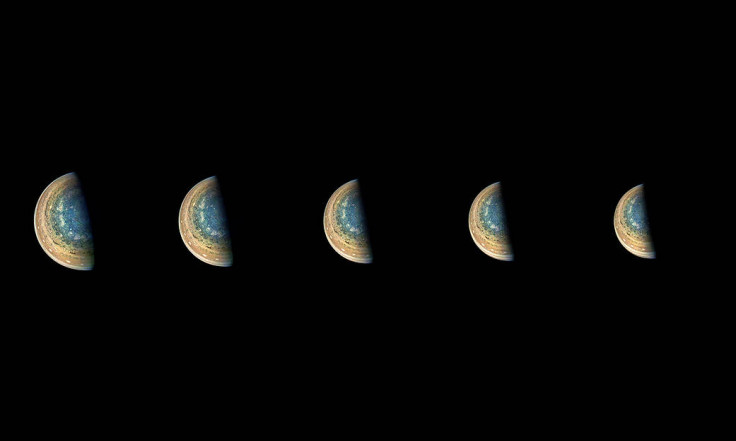Watch: Beautiful time-lapse sequence shows Juno probe move across Jupiter's transforming South Pole
The incredible array of time-lapse images was captured by the Juno spacecraft as it whipped past Jupiter during its 11th flyby.
Nasa's Juno spacecraft, which was launched in 2011 and is close to completing a dozen orbits around Jupiter, has captured an incredible array of time-lapse images that record the subtle but significant changes at the giant planet's South Pole.
The Juno probe was hovering above Jupiter's clouds, around 137,264 to 200,937 km away, when it captured the time-lapse sequence of images. The photos were captured by the Juno spacecraft on 7 February, as it whipped past Jupiter during its 11<sup>th flyby.
"At first glance, the series might appear to be the same image repeated. But closer inspection reveals slight changes, which are most easily noticed by comparing the far left image with the far right image," Nasa said in a statement.
Slight variations in the images helped indirectly capture the motion of the Juno probe itself, which was journeying around Jupiter, hundreds of millions of miles away from Earth. The images were captured by the JunoCam instrument aboard the spacecraft. The raw images were then processed by citizen scientist Gerald Eichstädt.
Juno was launched into space in 2011 and arrived into orbit in 2016. The data sent forward by the probe is ground-breaking, in that it reveals new information about Jupiter – the planet which is around 300 times more massive than Earth.
The spacecraft takes 53 days to complete one orbit of Jupiter and during extreme orbits, flies within 5,000 km of Jupiter's cloud tops. One of the spacecraft's primary objectives is to peer through the massive gas giant's dense cloud tops and determine the planet's structure.
According to Nasa, Juno's main goals are to learn how Jupiter was formed and how it evolved. The spacecraft will be studying Jupiter's magnetic and gravitational fields, explore the gas giant's swirling clouds that make up its typical colourful atmosphere and also help uncover what the planet is made of and whether it contains water.























